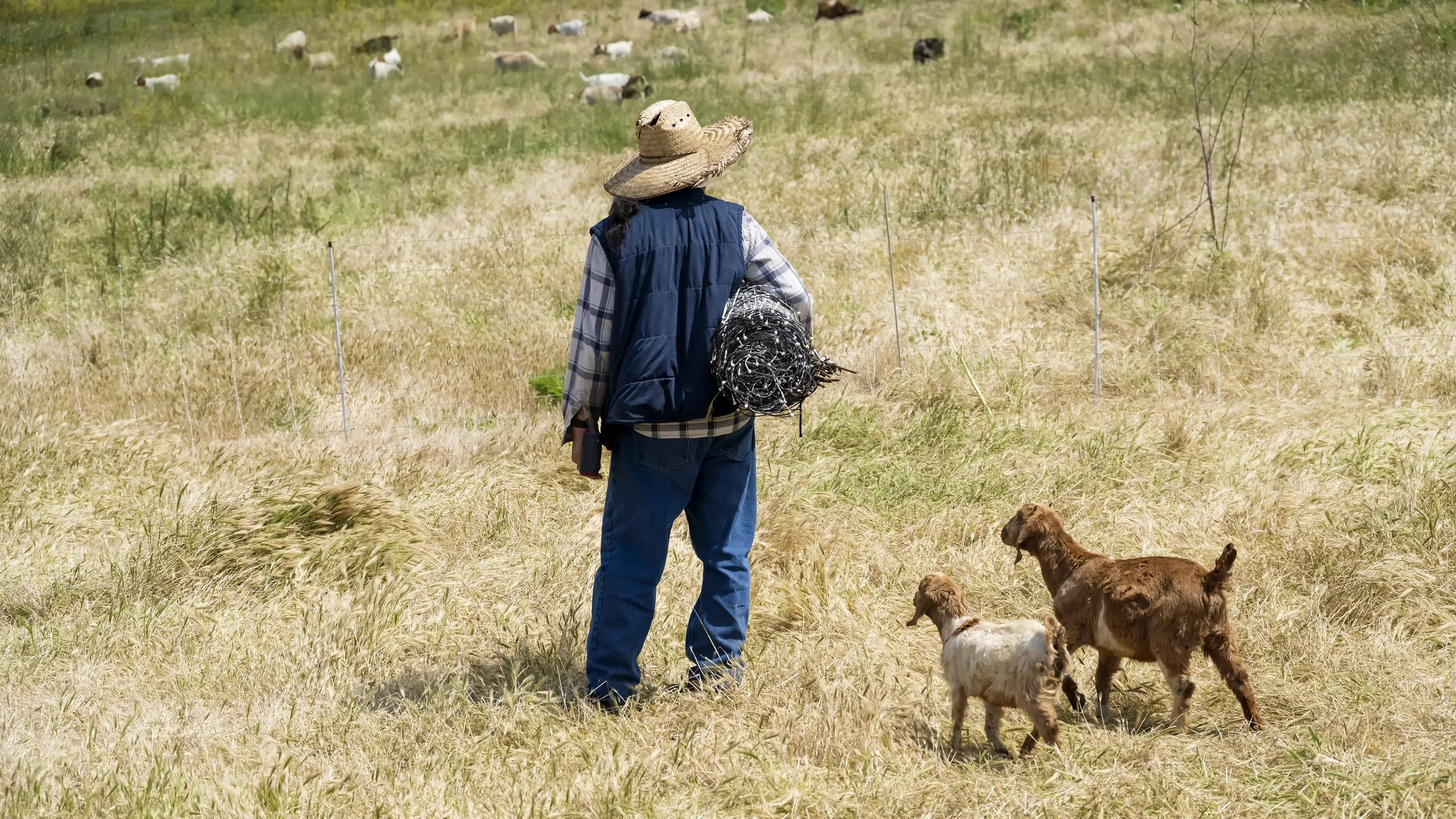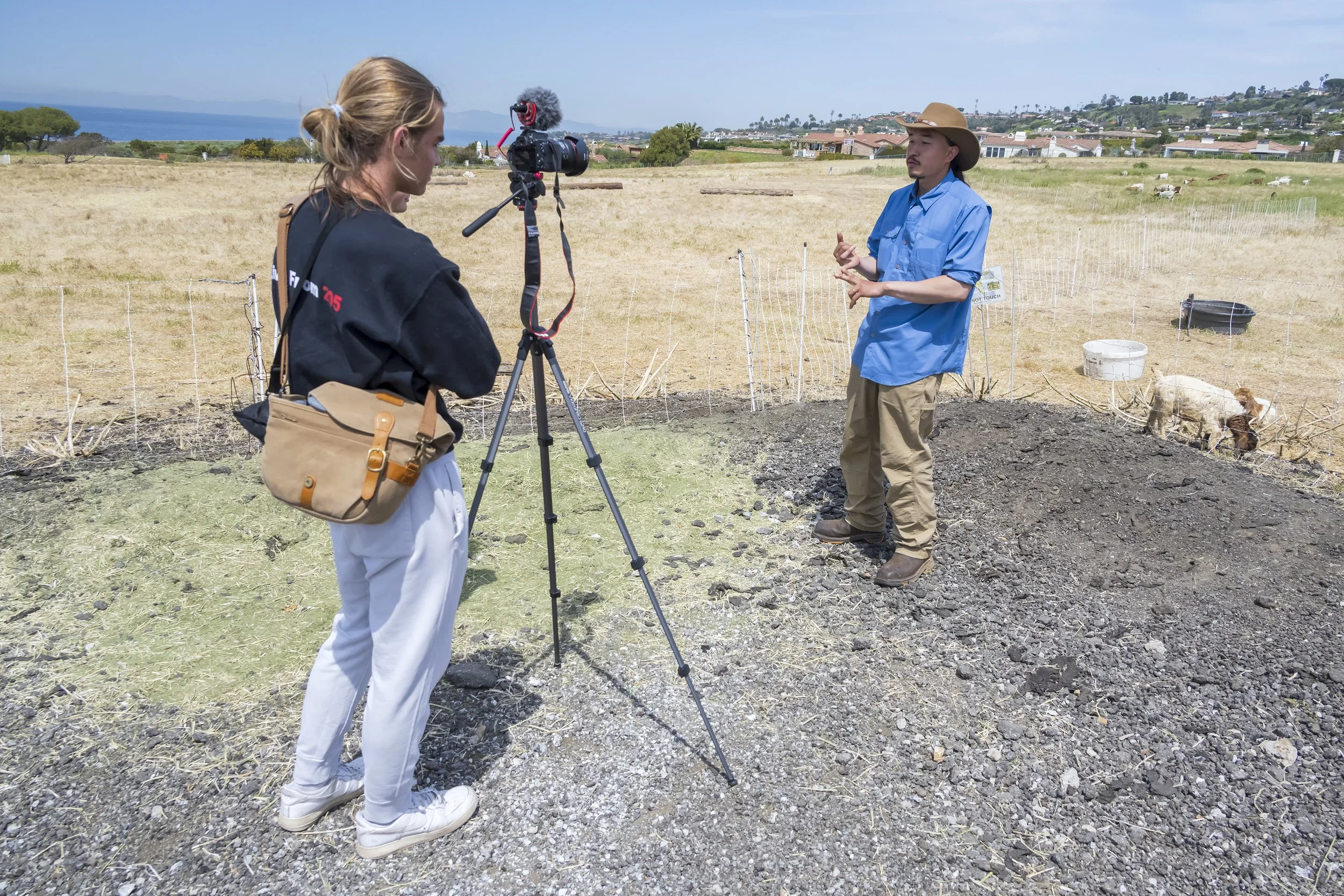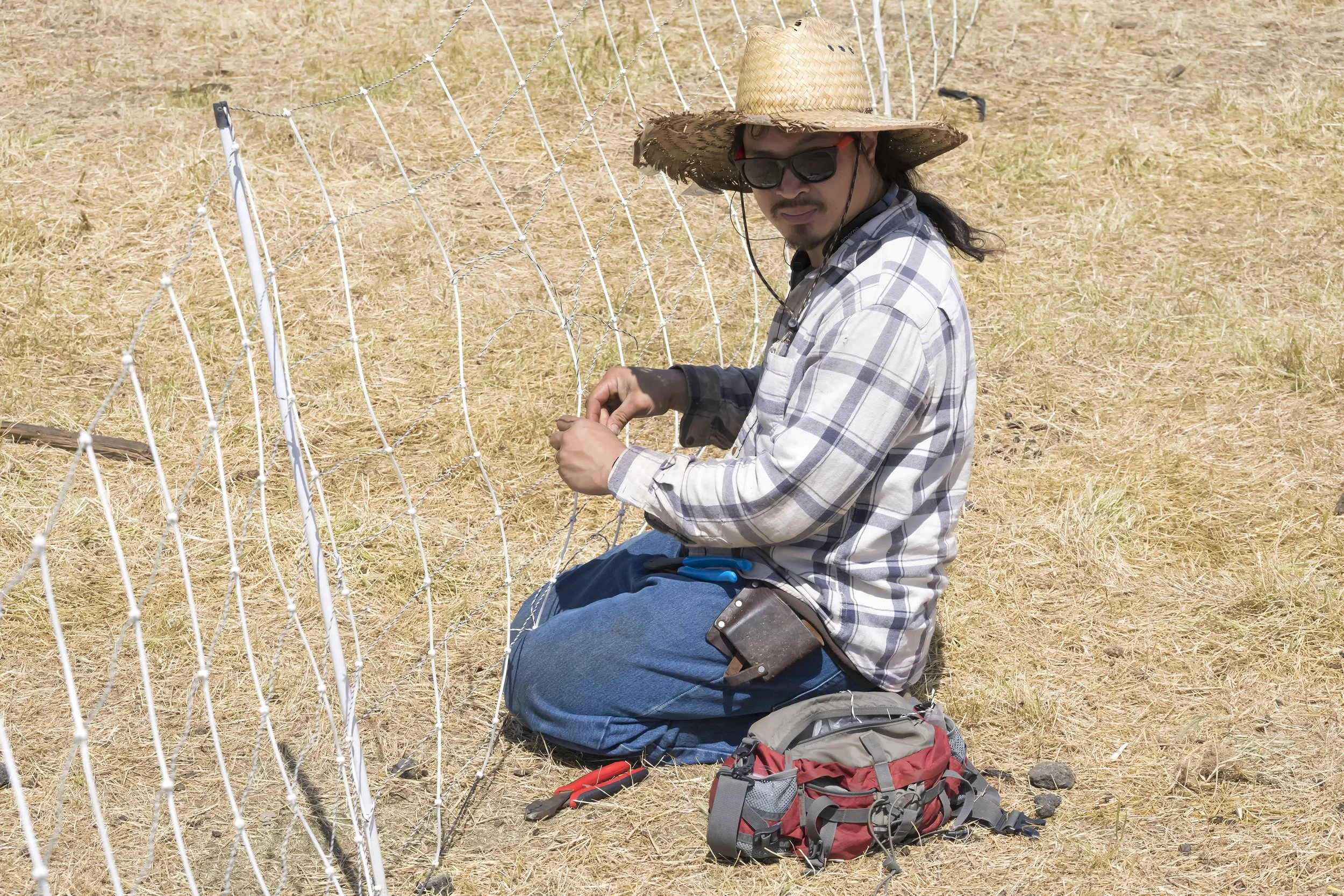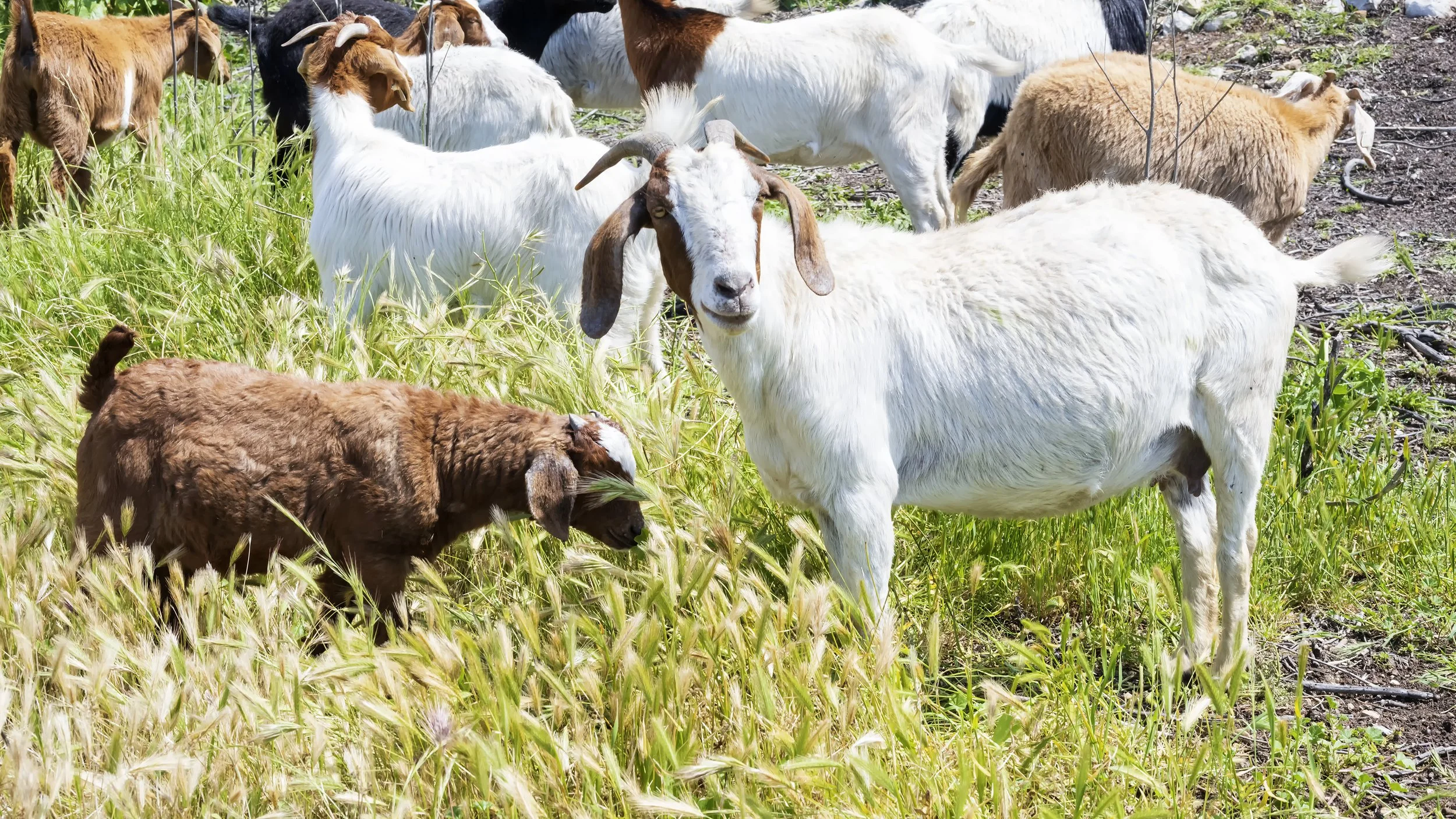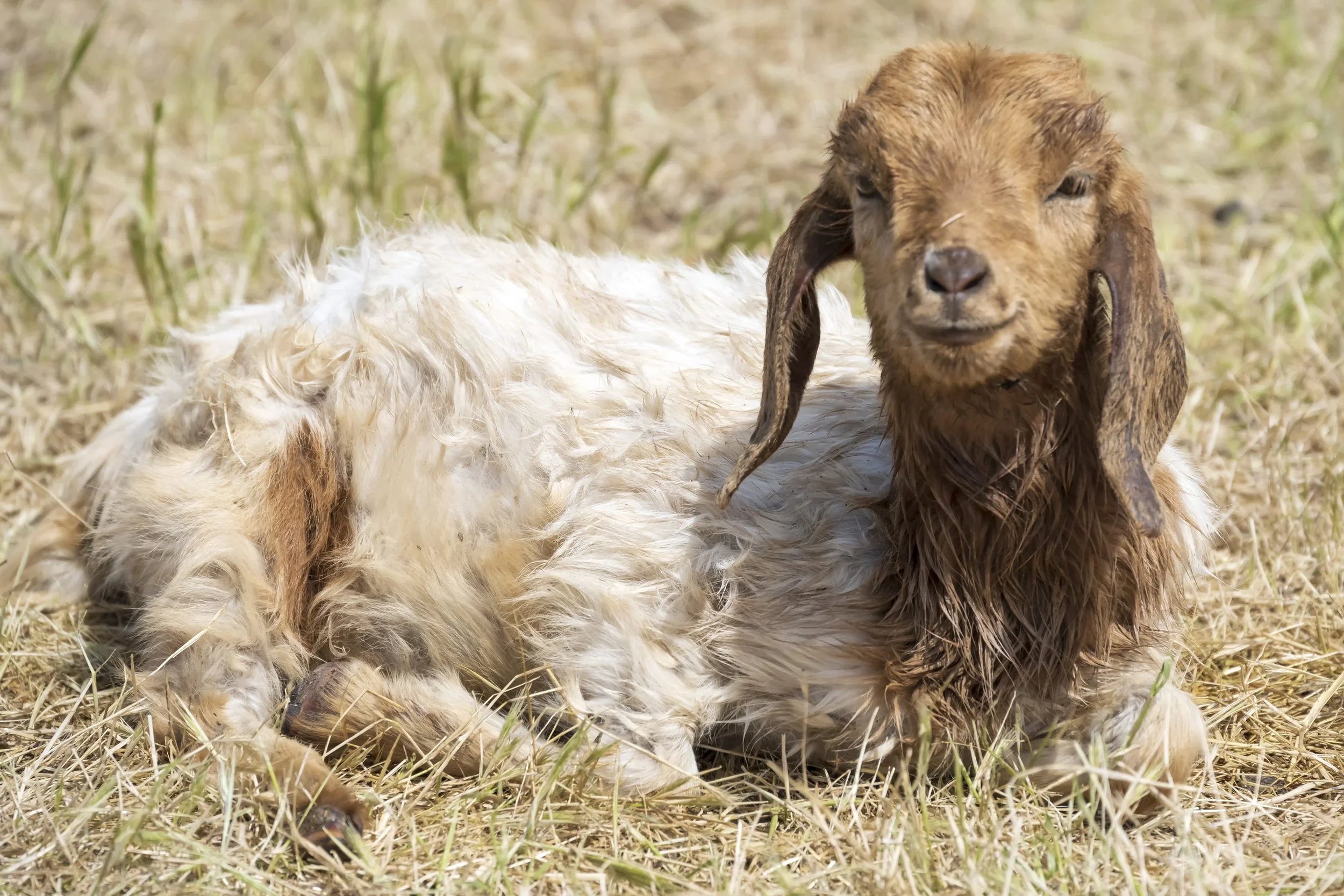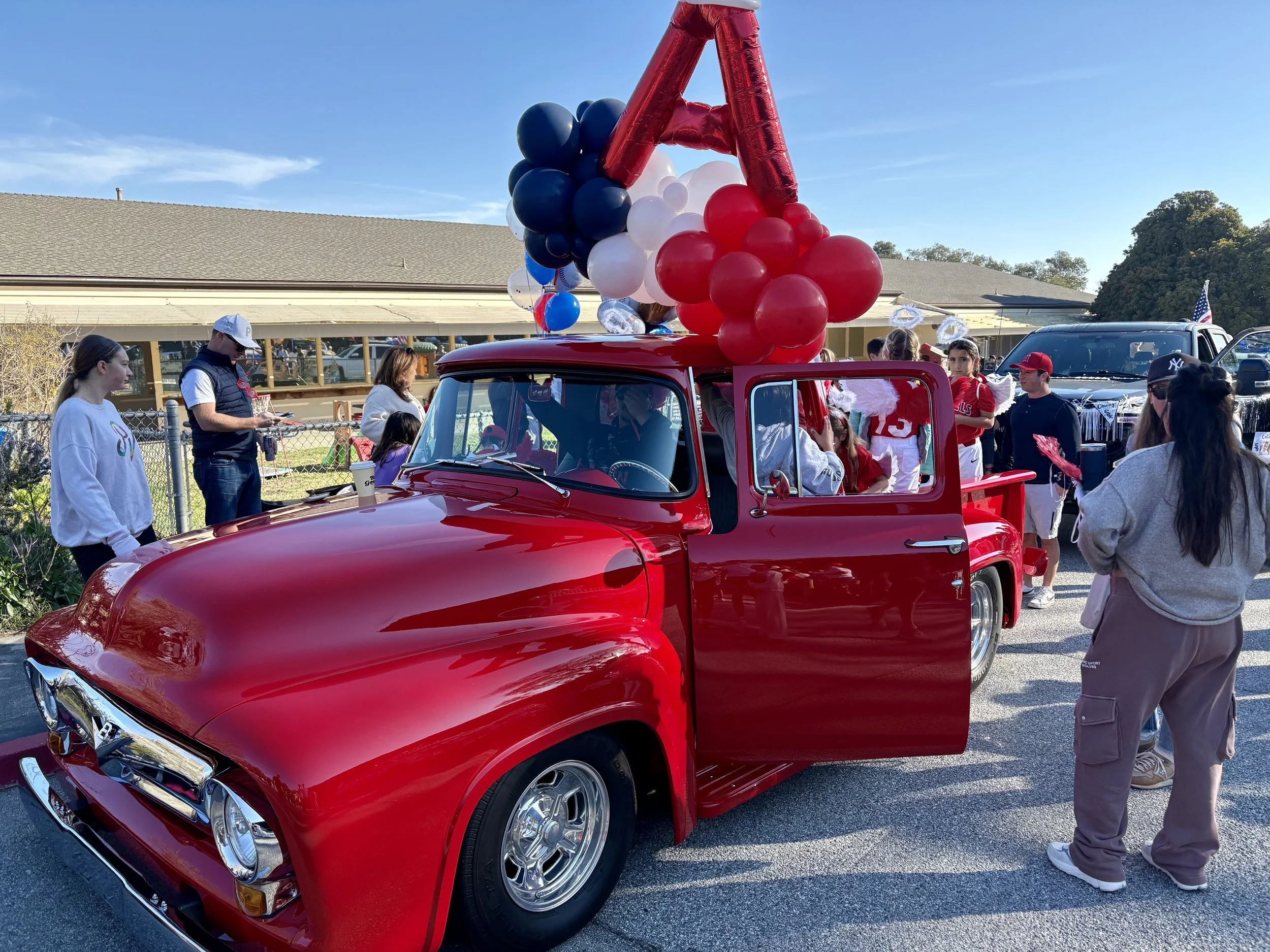Putting a 21st Century Twist on a Centuries Old Profession- Fire Grazers Returns to the Peninsula By Photographer and Contributor Steve Tabor
Michael Choi and his brothers, Aaron and Joseph, owners of Fire Grazers, Inc. have returned for their annual brush clearance activities across the Peninsula. To many Peninsula residents and residents of surrounding areas, they have become local celebrities along with their herd of 700 goats.
Members of Palos Verdes High School’s “Live from 205” news team interview Michael and a newcomer to the herd.
Michael admits that we have it much easier than the previous generations of shepherds, but he and his brothers learned at an early age that their family life would be much different than the average family. Mark Choi, the brothers’ father, was tired of the constraints of urban life and decided to seek a quieter sustainable lifestyle in California’s Mariposa County. The senior Choi, having little knowledge of goat ranching and the brush clearance business, turned to his mentor, Mike Canaday, for advice on how to create and sustain his Fire Grazers business.
Michael remembers Canaday telling his father that after starting the business they would never have a traditional family vacation again. Michael quickly learned, “Goats are a 24-hour, seven days a week business. Someone has to care for, feed and take of care other demands on the ranch from sunrise to sundown and at times well beyond sunset no matter the time of the year or weather conditions. This is especially true when we are on the road conducting brush clearing activities. Even though the goats are confined using an electronic fence, we have to monitor the herd to be certain no one escaped and keep a watch for possible predators.”
Michael states that he and his brothers lead a nomadic lifestyle and spend at least six months of the year away from their Mariposa County homes and living in a trailer. However, after doing this for over 13 years, it has become routine. Michael explains, “We fall into patterns for this lifestyle. Having visited many of the communities multiple times over the years, we know where the supermarkets are, we have favorite restaurants, places for acquiring necessary supplies, or even servicing our mobile home.”
As far as being away from family and friends for this extended period, Michael states, “We have a huge advantage over previous generations of shepherds. In previous times, shepherds left their homes and went out to isolated locations without any form of communication, leaving their family and friends wondering if their loved one would safely return on schedule or fall victim to some type of mishap. The shepherd would spend many hours with little to no human contact and without the many of the ‘comforts’ of home.”
Joseph outlines areas for brush clearance by erecting perimeter fencing to contain the goats and keep out predators.
Michael shares, “Now, we have smart phones, computers, and Wi-Fi that allows us to text, telephone and facetime our family and friends and have access to entertainment. Additionally, with three brothers, we can rotate leaving our work locations and return to the ranch in Mariposa County. It’s not a vacation, but it is still home! Additionally, if something should happen while we are on the road, we can be easily contacted, on the road home within minutes and be home within six hours.”
Michael indicates that one of the hardest aspects of this lifestyle is managing the business and ranch while his brothers and he are on the road. Michael explains, “This is not a one-man operation, there are several people in Mariposa County we depend on daily to assist with managing the business. We have payroll obligations, contracts to develop and manage, and other business activities, not to mention maintaining the ranch and caring for the animals.”
Having the assistance back home allows Michael and his brothers to concentrate on their activities in Southern California. In addition to brush clearance activities on the Peninsula, Fire Grazers will be conducting similar activities in Calabasas, Santa Clarita, and Orange County. On the Peninsula, Fire Grazers has contracts with the municipalities and the Palos Verdes Peninsula Land Conservancy.
The sites to be cleared are predetermined and prior to arriving on site, Michael and his brothers determine a starting point and set up electrical perimeter fencing to contain the goats once they are released. As the goats clear the area, the fencing is moved to allow the goats access to a new area to clear. Approximately 350 goats can clear one acre per day.
Michael points out, “Goats are ideally suited for this type of work. Sheep are grazers, they don’t like bushes. Goats have a hearty appetite and consume every type of vegetation. Also, they can easily scale steep terrain and do a better job of clearing a slope than humans can do.”
Currently, Fire Grazers is working two sites at a time on the Peninsula. They have equally divided their herd of 700 goats between the two sites. In addition to the brothers, Arturo, a South American shepherd, assists with managing the herd. Michael anticipates that it may be necessary to have Arturo’s brother, Niseforo, join them later in the season to assist with the herd as they move on to other locations. In addition to the human shepherds, Fire Grazers employ canines, Border Collies and Anatolian Shepherds, to assist with herding activities and help with protecting the goats from predators such as coyotes.
Michael and his brothers have worked with goats almost half of their lives. Even so, they admit that they encounter unexpected events or situations. Goats can develop illnesses, infections, or injuries. Michael states, “Sometimes we are able to manage the situation while we are in the field. Other times, we need to transport the animal back to the ranch and have the animal treated there. Furthermore, there are seasonal challenges that we have to cope with, but Spring time is generally among the easiest seasons for us. There is plenty of feed for the goats and they are generally very healthy. Winter storms and their aftermath present the greatest challenges to maintaining the health of the herd.”
Over the years, Michael has studied the goats’ family structure and social patterns. Michael shares, “They have a definite family structure. I have seen three generations of goats feeding and socializing together. Goats also develop friendships with other goats outside of their immediate family. But some goats are just mean by nature. They can be difficult to be around and there are very few goats they can be around.”
Michael anticipates that the Fire Grazers will be on the Peninsula for approximately two months. But the winter storms have increased the vegetation levels across the Peninsula. As a result, it is possible Fire Grazers may be spending a few more weeks feeding on the hillsides and canyons on the Peninsula.
Steve Tabor Bio
This South Bay native’s photographic journey began after receiving his first 35 mm film camera upon earning his Bachelor of Arts degree. Steve began with photographing coastal landscapes and marine life. As a classroom teacher he used photography to share the world and his experiences with his students. Steve has expanded his photographic talents to include portraits and group photography, special event photography as well as live performance and athletics. Steve serves as a volunteer ranger for the Catalina Island Conservancy and uses this opportunity to document the flora and fauna of the island’s interior as well as photograph special events and activities.
Watch for Steve Tabor Images on the worldwide web.

